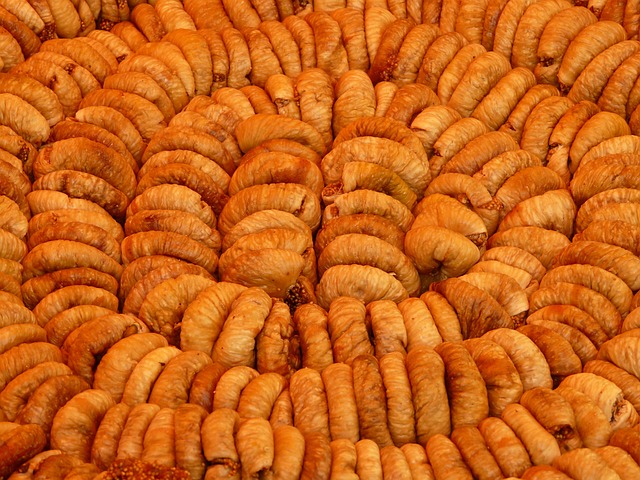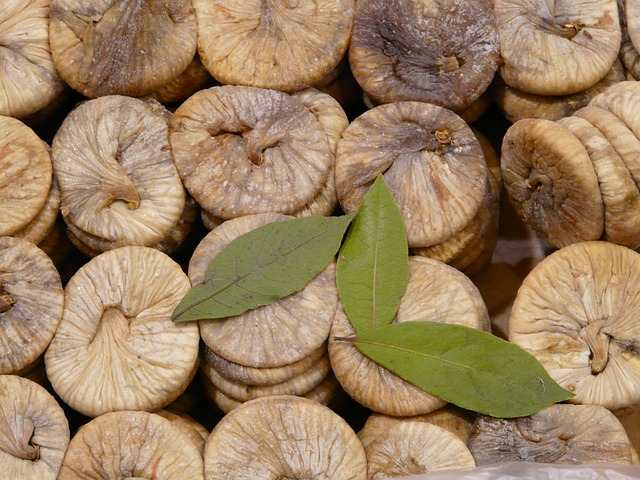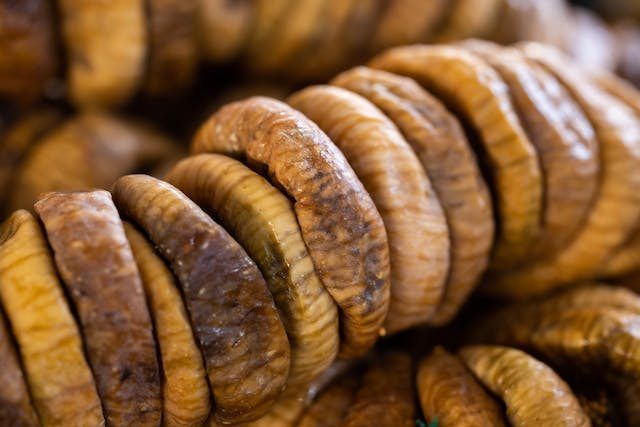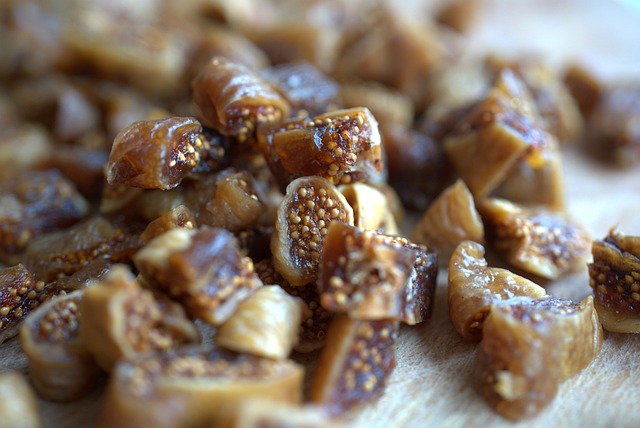Dried figs are a popular and versatile snack enjoyed for centuries. These delightful fig fruits offer various health benefits and can be easily incorporated into your diet.
Dried figs are a fantastic source of dietary fiber, vitamins, and minerals. They are particularly rich in potassium, calcium, and iron. Their chewy texture and sweet taste make figs an excellent choice for a quick breakfast or a midday snack at work or school.
Whether you enjoy them straight out of the bag or use them in recipes like salads or desserts, dried figs are sure to add a burst of flavor to any dish. So let’s dive in and discover how to incorporate these nutritious fig treats into your daily routine.

What are Figs?
Figs are sweet fruits that come from the ficus tree. They have a unique texture with tiny seeds inside. These fig fruits can be consumed fresh or dried for a longer shelf life. Figs are not only delicious but also packed with numerous health benefits.
Rich in Fiber
One of the standout features of figs is their high fiber content. Fiber plays a crucial role in maintaining a healthy digestive system and preventing constipation. By adding figs to your diet, you can ensure regular bowel movements and promote overall gut health.
Abundant in Vitamins and Minerals
In addition to fiber, figs are also rich in essential vitamins and minerals. They contain vitamins A, B1, B2, and K, as well as minerals like potassium, calcium, magnesium, and iron. These nutrients contribute to various bodily functions such as maintaining bone health, supporting immune function, and aiding in energy production.
Antioxidant Powerhouse
Figs boast an impressive array of antioxidants that help protect the body against oxidative stress caused by harmful free radicals. Antioxidants play a vital role in reducing inflammation and lowering the risk of chronic diseases such as heart disease and certain types of cancer.
Heart-Healthy Benefits
Including figs in your diet can be beneficial for heart health due to their high potassium content. Potassium helps regulate blood pressure levels by counteracting the effects of sodium on the body. By maintaining healthy blood pressure levels, figs contribute to a reduced risk of cardiovascular diseases.
Natural Energy Boosters
If you’re looking for a natural energy boost without relying on caffeine or sugary snacks, reach for some dried figs! Figs contain natural sugars that provide quick energy when you need it most. Their fiber content also helps slow down sugar absorption into the bloodstream, preventing sudden spikes and crashes in energy levels.

Versatile Culinary Ingredient
Not only are figs nutritious, but they are also incredibly versatile in the kitchen. You can enjoy them fresh as a snack, add them to salads for a touch of sweetness, or incorporate them into both sweet and savory dishes. Mission figs, a popular variety of figs, are often used in desserts like pies and tarts due to their rich flavor.
Digestive Health Benefits
Thanks to their high fiber content, figs promote healthy digestion by adding bulk to the stool and supporting regular bowel movements. This can alleviate common digestive issues such as constipation and bloating. Including figs in your diet can help maintain a healthy gut and prevent gastrointestinal discomfort.
Weight Management Aid
If you’re trying to manage your weight, incorporating figs into your diet can be beneficial.
Figs Nutrition
Figs are not only delicious but also packed with essential nutrients that can contribute to your overall health. Let’s take a closer look at the nutritional benefits of dried figs.
Fresh figs are a healthy snack that provides essential nutrition. They are rich in potassium, calcium, and vitamin K, and have a sweet flavor.
Potassium is an important mineral that helps regulate blood pressure and maintain proper heart function. Fresh figs are a great source of potassium, providing you with a natural way to keep your heart healthy. Calcium is vital for strong bones and teeth, and it also plays a crucial role in muscle function and nerve transmission. Vitamin K is necessary for blood clotting and bone health. By including fresh figs in your diet, you can boost your intake of these essential nutrients.
They are also a good source of dietary fiber and antioxidants, making them a healthy snack choice. Fruits are known for their nutritional value and are naturally gluten-free.
Dietary fiber is crucial for maintaining a healthy digestive system. It aids in digestion, prevents constipation, and promotes regular bowel movements. Figs are rich in dietary fiber, making them an excellent addition to your diet if you’re looking to improve your digestive health. Antioxidants help protect our bodies against damage caused by harmful molecules called free radicals. Figs contain various antioxidants that can help reduce inflammation and combat oxidative stress.
Figs are a healthy snack option that provides natural sugars for energy without any fat content. They are a great choice for a fruit snack during the Christmas season and can be enjoyed on any given day.
If you’re looking for a natural energy boost without the added fat content, then dried figs are an excellent choice. They contain natural sugars that can provide you with the energy you need throughout the day. Unlike processed snacks or sugary drinks that often come with unhealthy fats, dried figs offer a healthier alternative to satisfy your sweet tooth while keeping you energized.
Including figs in your diet can contribute to overall health, especially during Christmas when families gather to celebrate this special day. Figs are a delicious fruit that can be enjoyed by the whole family.
By incorporating dried figs into your daily diet, you can enjoy numerous health benefits:
- Heart Health: The potassium content in figs supports cardiovascular health by helping regulate blood pressure.
- Bone Health: Figs are a good source of calcium and vitamin K, both of which are essential for maintaining strong bones.
- Digestive Health: The dietary fiber in figs promotes regular bowel movements and helps prevent constipation.
- Weight Management: Dried figs can be a satisfying snack option due to their high fiber content, helping you feel fuller for longer periods.
- Antioxidant Protection: The antioxidants found in figs help reduce inflammation and protect against oxidative stress.
Incorporating dried figs into your diet is simple. You can enjoy them as a standalone snack or incorporate them into various recipes. They can be added to salads, oatmeal, yogurt, or even used as a topping for desserts.

Are Dried Figs as Healthy as Fresh Figs?
Many people wonder if dried figs are just as healthy as fresh ones. Let’s dive in and explore the nutritional value of dried figs compared to their fresh counterparts.
Drying figs preserves their nutritional value to a large extent, making them a perfect addition to your Christmas spread for the whole family to enjoy.
Dried figs are made by removing the water content from fresh figs through a drying process. This preservation method helps retain most of the nutrients found in fresh figs, making dried figs a nutritious snack option. While some vitamins and minerals may be slightly reduced during the drying process, the overall nutrient profile remains intact.
While fresh figs have higher water content, dried figs concentrate their nutrients. This makes them a great addition to your Christmas menu, especially if you want to create a healthy and delicious dish for your family.
Fresh figs contain a high percentage of water, which contributes to their juicy and refreshing texture. On the other hand, drying figs removes the majority of this water content, resulting in a more concentrated form of nutrients. This means that while you may consume fewer dried figs by weight compared to fresh ones, you’ll still benefit from similar nutritional value due to this concentration effect.
Both fig forms offer similar health benefits but differ slightly in terms of certain vitamins and minerals.
Whether you choose to enjoy fresh or dried figs, both forms provide numerous health benefits. They are excellent sources of dietary fiber, which aids digestion and promotes feelings of fullness. Both types contain essential minerals such as potassium and magnesium that support heart health and help regulate blood pressure.
However, there are slight differences between the two. Fresh figs tend to be higher in vitamin C due to their moisture content. On the other hand, dried figs have higher concentrations of certain B vitamins like thiamin (B1) and riboflavin (B2). These variations make incorporating both forms into your diet beneficial for obtaining a wide range of nutrients.
Incorporating either fresh or dried figs into your diet is beneficial.
Whether you prefer the chewy texture of dried figs or the succulent sweetness of fresh figs, both options can be a healthy addition to your diet. Here are some reasons why incorporating either form of figs is beneficial:
- Rich in antioxidants: Figs, both fresh and dried, contain antioxidants that help protect the body against damage from harmful free radicals.
- Promote digestive health: The high fiber content in figs supports healthy digestion and can help prevent constipation.
- Good for bone health: Figs are a good source of calcium and other minerals essential for maintaining strong bones.
- Natural sweetness:
Benefits and Nutritional Value of Dried Figs
Dried figs are more than just a delicious snack; they offer a plethora of health benefits and are packed with essential nutrients. Let’s explore the advantages of incorporating dried figs into your diet.
Excellent Source of Dietary Fiber for Improved Digestion
One significant benefit of dried figs is their high dietary fiber content. Fiber plays a crucial role in maintaining a healthy digestive system. It adds bulk to the stool, aiding in regular bowel movements and preventing constipation. Fiber promotes satiety, helping you feel fuller for longer periods, which can be beneficial for weight management.
Iron Content for Healthy Blood Cells and Anemia Prevention
Iron is an essential mineral that helps produce hemoglobin, the protein responsible for carrying oxygen throughout the body via red blood cells. Dried figs contain a good amount of iron, making them an excellent natural source to maintain healthy blood cells. Consuming dried figs regularly can help prevent iron deficiency anemia, which can lead to fatigue, weakness, and decreased immunity.
High Antioxidant Content Supports Immune Function and Fights Inflammation
Dried figs are rich in antioxidants that play a vital role in supporting immune function and fighting inflammation within the body. Antioxidants help protect our cells from damage caused by harmful free radicals. By reducing oxidative stress and inflammation, dried figs may contribute to overall well-being and lower the risk of chronic diseases such as heart disease, diabetes, and certain types of cancer.
Calcium for Bone Strength
Calcium is crucial for maintaining strong bones and teeth. While many people associate calcium with dairy products like milk or cheese, dried figs also provide a notable amount of this essential mineral. Regular consumption of dried figs can be particularly beneficial for individuals who follow a plant-based or lactose-free diet but still need to meet their calcium requirements.

Potassium for Heart Health
Potassium is an electrolyte that plays a vital role in maintaining heart health and regulating blood pressure. Dried figs are a good source of potassium, which helps counteract the negative effects of sodium on blood pressure levels. Adequate potassium intake can support cardiovascular health and reduce the risk of hypertension and stroke.
Incorporating Dried Figs into Your Diet
Now that we’ve explored the numerous benefits and nutritional value of dried figs, you may be wondering how to incorporate them into your diet. Here are some simple ways to enjoy this nutritious fruit:
- Snack on dried figs as they are, or pair them with nuts for a satisfying and healthy snack.
Can You Refrigerate Dried Figs?
The question often arises: should you refrigerate them or not? Let’s dive into this topic and explore the best way to store these delicious treats.
Not Necessary to Refrigerate
It is not necessary to refrigerate dried figs if they are properly stored in an airtight container at room temperature. These sweet and chewy fruits can be kept safely in your pantry or kitchen cupboard without any issues.
Refrigeration may cause moisture absorption, which can lead to mold growth on the surface of the figs. This is something we definitely want to avoid! So, unless you live in a hot and humid climate, there’s no need to take up precious fridge space for your dried figs.
Hot and Humid Climate Considerations
Living in a hot and humid climate can pose challenges. In such conditions, refrigeration can help extend the shelf life of dried figs. The cool temperature helps prevent moisture buildup and inhibits mold growth.
If you find that your area experiences high temperatures or humidity levels, opting for refrigeration might be a good idea. Just make sure to transfer your dried figs into an airtight container before placing them in the refrigerator. This will provide extra protection against moisture absorption.
Packaging Instructions
When purchasing dried figs, always check the packaging instructions for specific storage recommendations. Different brands or suppliers may have varying guidelines based on their product quality and packaging methods.
Some packages may advise refrigerating the dried figs after opening, while others may suggest keeping them at room temperature as long as they are sealed tightly. Following these instructions will help ensure that your dried figs remain fresh and flavorful for longer periods.
Proper Storage Tips
Whether you decide to store your dried figs at room temperature or in the refrigerator, there are some general guidelines to keep in mind for proper storage:
- Use an airtight container: This will prevent moisture and air from reaching the figs, helping to maintain their texture and taste.
- Keep away from sunlight: Exposure to direct sunlight can cause the figs to lose their color and become dry. Store them in a cool, dark place for optimal preservation.
- Avoid contact with strong odors: Dried figs can absorb odors from other foods, so it’s best to store them separately or in a well-sealed container.
- Check for signs of spoilage: Before consuming dried figs, inspect them for any signs of mold, discoloration, or off smells. If you notice any of these indicators, it’s best to discard them.
Tips for Selecting and Storing Dried Figs
There are a few key tips to keep in mind. By following these guidelines, you can ensure that your dried figs are of the highest quality and maintain their freshness for an extended period.
Choose plump, soft, and mold-free dried figs
To enjoy the best-tasting dried figs, it’s important to choose ones that are plump, soft, and free from any signs of mold or discoloration. When you’re at the store or market, take a close look at the dried figs before making your selection. Avoid any packages that have clumps or hardened pieces as this may indicate poor quality.
Store in a cool, dry place away from sunlight
Proper storage is crucial for maintaining the freshness of dried figs. To prevent them from becoming dry or losing their flavor, store them in a cool and dry place. Direct sunlight can cause the figs to lose moisture and become less enjoyable to eat. Find a spot in your pantry or cupboard where they won’t be exposed to heat or light.
Use proper storage containers
To keep your dried figs fresh for as long as possible, it’s essential to use appropriate storage containers. Opt for airtight containers made of glass or plastic with secure lids. These containers will help protect the figs from moisture and air exposure. Avoid using paper bags or cardboard boxes as they do not provide adequate protection against humidity.

Add parchment paper between layers
If you’re storing multiple dried figs together, it’s advisable to add a small piece of parchment paper between each layer. This helps prevent clumping and sticking together while also allowing air circulation between the figs. By doing so, you can easily access individual pieces without having to pry them apart.
Properly stored dried figs last up to six months
When stored correctly, dried figs can maintain their quality for up to six months. However, it’s important to note that the longer they are stored, the more their flavor and texture may change. To ensure you’re enjoying the best taste experience, try to consume them within a few months of purchase.
Check for freshness before consuming
Before enjoying your dried figs, always check for freshness. While properly stored figs can last for several months, it’s still essential to inspect them before eating. Look out for any signs of mold or an off smell. If you notice any discoloration or an unpleasant odor, it’s best to discard those figs as they may no longer be safe to eat.
How to Incorporate Dried Figs into Your Diet
Dried figs are not only delicious but also packed with nutrients. Here are some creative ways to incorporate dried figs into your diet and enjoy their sweet, chewy goodness.
Enjoy dried figs as a standalone snack for a quick energy boost.
When you’re in need of a quick pick-me-up, reach for a handful of dried figs. They make for an excellent on-the-go snack that provides natural sugars and fiber, giving you an instant energy boost. Plus, the chewy texture and sweet flavor make them a satisfying treat.
Add chopped dried figs to your morning cereal or oatmeal for added sweetness and texture.
If you’re looking to enhance the flavor profile of your breakfast, consider adding chopped dried figs to your cereal or oatmeal. The natural sweetness of the figs will add a delightful burst of flavor, while their chewiness will provide an interesting contrast to the softness of your breakfast bowl.
Use figs in baking recipes like cookies, cakes, or bread for natural sweetness without refined sugar.
One fantastic way to incorporate dried figs into your diet is by using them in baking recipes. Whether you’re making cookies, cakes, or bread, substituting refined sugar with dried figs can add natural sweetness and depth of flavor. Simply chop the dried figs into small pieces and fold them into your batter before baking. You’ll be amazed at how they transform your baked goods!
Blend soaked dried figs into smoothies or use them as toppings for yogurt or salads.
For those who love smoothies or enjoy yogurt bowls and salads, soaked dried figs can be a game-changer. Soak the dried figs in water until they become plump and tender. Then blend them into your favorite smoothie recipe for added richness and natural sweetness. Alternatively, sprinkle chopped soaked dried figs on top of your yogurt or salads for a delightful burst of flavor and texture.
Difference Between Sun-dried and Processed Figs
Sun-dried figs are naturally dried under the sun without any additional processing methods.
Sun-dried figs are a delicious and nutritious snack that is made by simply drying fresh figs under the sun. This traditional method involves placing the figs on trays or racks and allowing them to dry naturally over a period of time. No additional processing methods or chemicals are used in this process, making sun-dried figs a natural and wholesome choice.
Processed figs may undergo treatments like sulfur dioxide fumigation or artificial drying techniques.
On the other hand, processed figs often go through various treatments and techniques to speed up the drying process. One common method is sulfur dioxide fumigation, which helps preserve the color of the fruit but can also affect its nutritional content. Artificial drying techniques such as using ovens or dehydrators may be employed to accelerate the drying time.
Sun-drying figs preserves more nutrients but takes longer compared to processed drying methods.
Sun-dried figs have an advantage over their processed counterparts. The slow and gentle drying process allows the figs to retain more of their natural vitamins, minerals, and antioxidants. These nutrients contribute to overall health benefits such as improved digestion, boosted immune system, and enhanced skin health. However, it’s important to note that some nutrient loss can still occur during any drying process.
Both types of dried figs are widely available and can be used interchangeably in most recipes.
Whether you prefer sun-dried or processed figs, you’ll be pleased to know that both varieties are readily available in stores and can be used interchangeably in most recipes. They add a sweet and chewy texture to dishes like salads, baked goods, trail mixes, and even savory dishes like stews or tagines. So don’t worry if you can’t find one type of dried figs, as the other will work just as well.
Conclusion
In conclusion, dried figs are a nutritious and versatile snack that can be easily incorporated into your diet. They offer numerous health benefits and are packed with essential nutrients like fiber, vitamins, and minerals. Whether you enjoy them on their own as a quick snack or add them to your favorite recipes, dried figs can be a delicious and convenient way to boost your overall well-being.
To make the most of dried figs, it is important to choose high-quality products and store them properly. Look for figs that are plump, soft, and free from any discoloration. Store them in an airtight container in a cool, dry place to maintain their freshness and flavor.
Now that you have learned about the nutritional value of dried figs and how to select and store them correctly, why not start incorporating this delightful fruit into your daily routine? Try adding chopped dried figs to your morning oatmeal or yogurt for added sweetness and texture. You can also use them in baking or as a topping for salads or cheese plates. Get creative with your culinary adventures and enjoy the many benefits that dried figs have to offer!
Remember, always consult with a healthcare professional before making any significant changes to your diet or if you have specific dietary concerns or conditions.

FAQs
What are dried figs?
Dried figs are the dehydrated version of fresh figs. They are a popular snack and ingredient in various cuisines around the world.
How do you eat dried figs?
Dried figs can be enjoyed on their own as a healthy snack, or they can be used in cooking and baking. They add a sweet and chewy texture to dishes like salads, desserts, and even savory recipes.
Are dried figs good for you?
Yes, dried figs are packed with nutrients. They are a great source of fiber, vitamins, and minerals such as potassium and calcium. They also contain antioxidants that help protect your body against free radicals.
Can dried figs help with digestion?
Absolutely! Dried figs are known for their high fiber content, which aids in digestion and helps prevent constipation. Including them in your diet can promote regular bowel movements.
Where can I buy dried figs?
You can find dried figs at most grocery stores or health food stores. They are widely available online through various retailers. Make sure to choose high-quality organic options for the best taste and nutritional value.
How should I store dried figs?
To keep your dried figs fresh and tasty, store them in an airtight container or resealable bag in a cool, dry place. Avoid exposing them to moisture or direct sunlight to maintain their quality over time.
Are there any potential allergens in dried figs?
While rare, some individuals may have allergies to certain fruits including figs. If you have known allergies or sensitivities to fruits, it’s best to consult with your healthcare provider before consuming dried figs.
Ready to enjoy the deliciousness of dried figs? Try incorporating them into your favorite recipes or grab a handful as a quick and nutritious snack!
